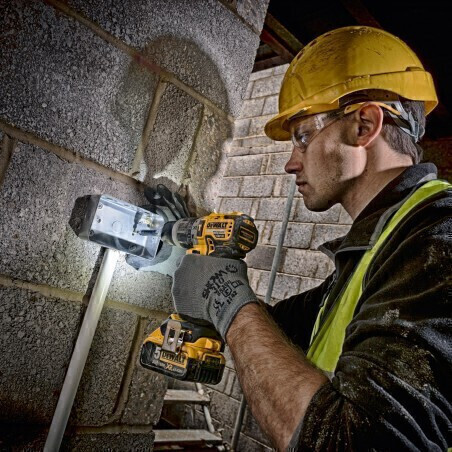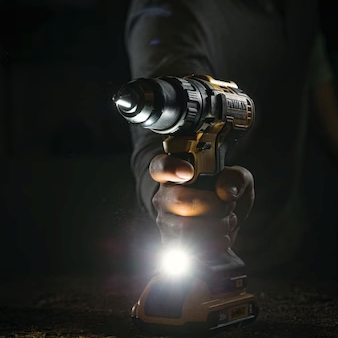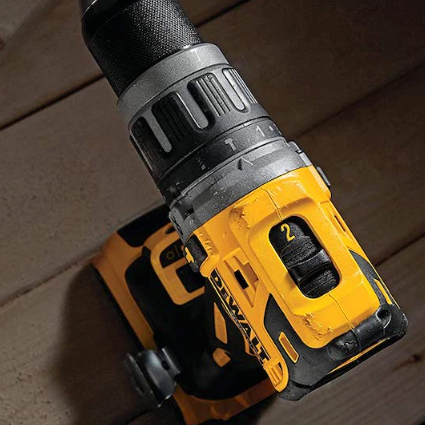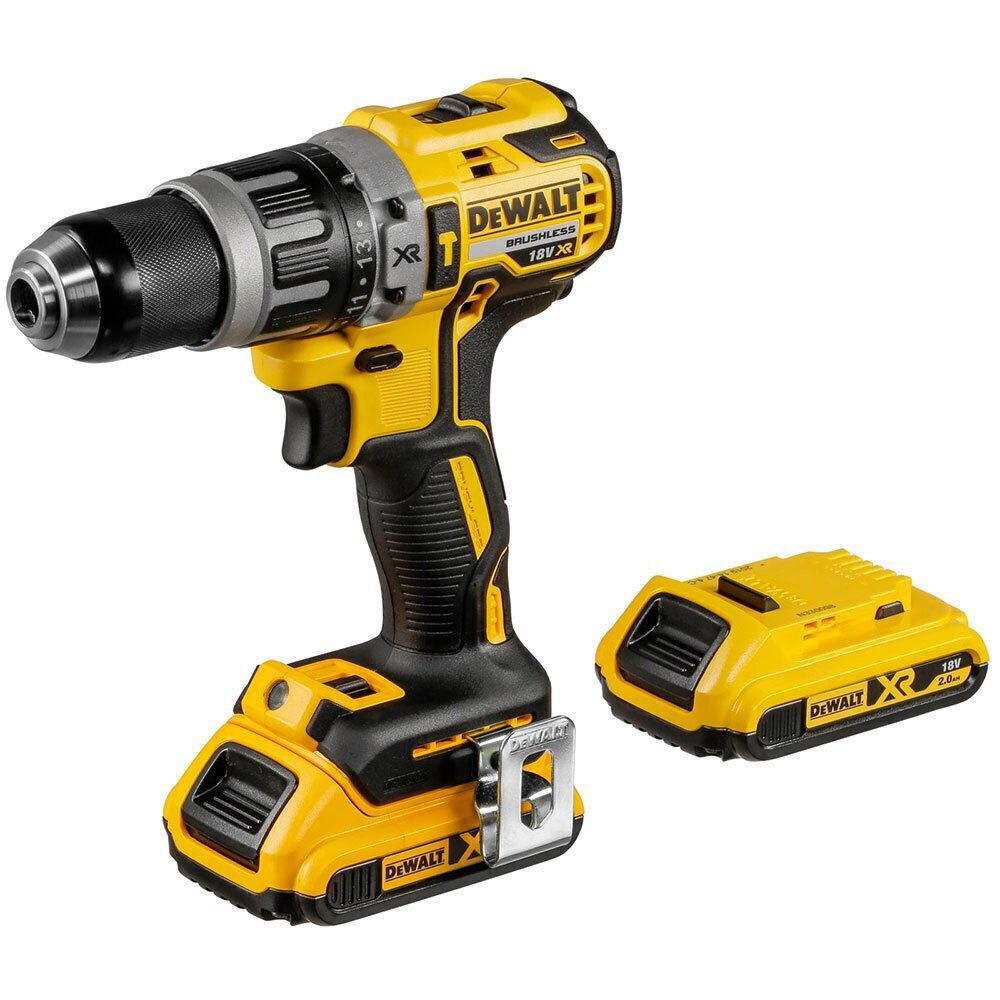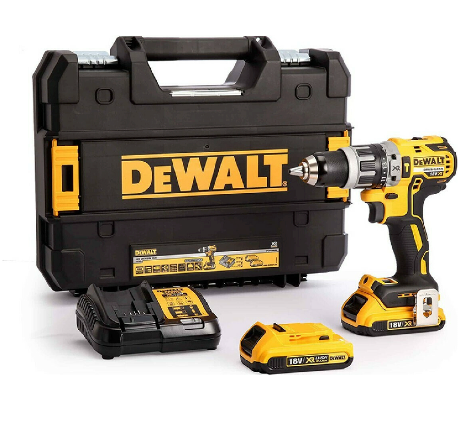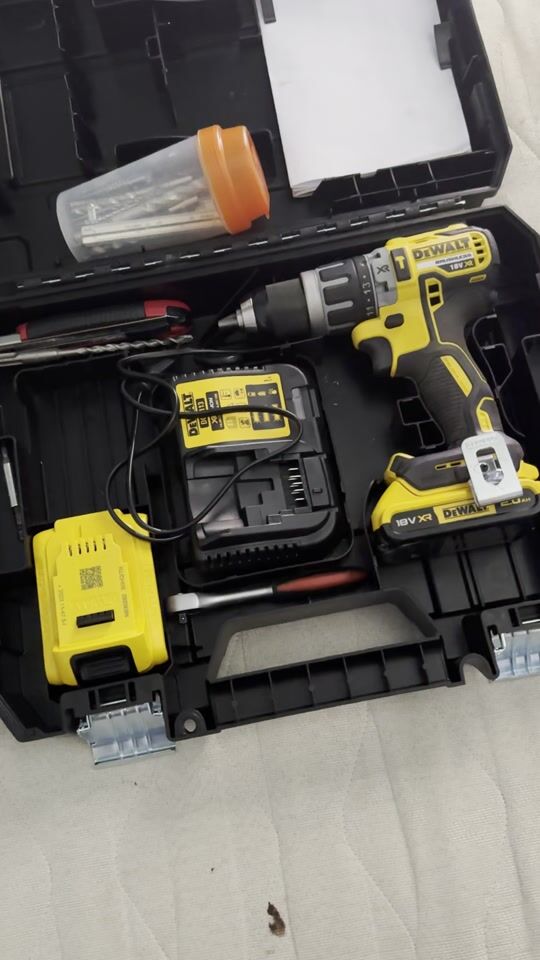I bought the DCD796P2 package (2 batteries 2Ah + charger + case). First, I will provide some information that I had difficulty finding when I was searching for what to buy, in case it helps someone.
- The model they sell in America (20V MAX) is advertised as made in the USA. The model they sell in Europe is not. What I bought is made in the Czech Republic. The batteries are made in China.
- Dewalt sources batteries (the internal components) from Sanyo, which is a subsidiary of Panasonic, the largest battery company today.
- The tool weighs 1277gr on its own and 1640gr with one 2Ah battery.
- The chuck is metal and all the gears (gears + gear housing) are metal.
- Unlike most drills, the chuck does not come off by simply loosening an Allen screw. You have to disassemble half the tool.
- The charger that comes with the P2 package charges at 2A, it is not the fast charger that charges at 4A. This means that a 2Ah battery takes 1 hour to charge and not half an hour, like it does with the fast charger. The package with the two fives comes with the fast charger.
As for my experience so far, compared to two other cordless drills (Makita DHP484 54Nm, 2000rpm, Einhell TC-CD 40Nm, 1250rpm) and a Black & Decker mains drill 710W 2800rpm:
Power: Unmatched. It claims to drill up to 13mm in concrete. I drilled a 16mm hole in 20-point concrete. You don't notice any lag compared to the mains drill and it outperforms noticeably compared to the Einhell and slightly compared to the Makita. You don't notice it in screwing, unless it's something very hard. But in drilling (especially concrete) you notice the difference. The 2000rpm is a big deal. It drills the wall like the black & decker (just like the Makita).
Impact: Incredible. It gives you the feeling that it's better than the mains drill. You feel it kicking like a compressor. Maybe that's why it drills concrete faster than the Makita.
Quality-Ergonomics: Very good plastics, quality construction that reflects the money you paid. Very good ergonomics and good balance. Very lightweight, it feels like a heavy screwdriver. Especially with the 2Ah batteries, you don't notice it at all. One small downside (compared to the Makita): The chuck is slightly heavier and longer, causing it to push the wrist slightly more forward compared to the Makita (we're talking about small differences that I wouldn't notice if I didn't have both drills).
Trigger accuracy: It has very good accuracy that helps with screwing small screws. Almost the same as the Makita and no comparison to the Einhell.
Chuck: Although everyone says it has a lot of play, it does NOT. It is the same as the Makita, while the Einhell has more play. You don't notice it at all when drilling. You notice it slightly when screwing, but all impact drills are like that. Some people mention that the drill bit flies out. It only happened to me the first time I used a hole saw. Never again after that. Even with a 40-point hole saw (I've opened 2 holes), it didn't fly out. Some others mention that when screwing straight screws, the nose kicks due to the play in the chuck. It never happened to me, even with self-drilling screws.
Brake: Very abrupt. I just mention it as information, not as a disadvantage.
Noise: Like the others, a bit noisier. I suspect that, in order to achieve the 70Nm, they put a faster motor and a smaller gear in the gearbox (on the motor side). Purely my opinion, without having read it anywhere. Don't pay too much attention to it.
Batteries: I can't estimate how long they last compared to other tools because I don't do standard jobs every day. An indication is that the 16mm hole I drilled in concrete consumed two bars of the battery. Otherwise, they seem good. They have a 3-bar charge indicator. One small downside: they don't fit tightly on the tool, they have a very slight 'play', while they fit perfectly on the Makita.
Charger: As I said, the P2 model has the one that charges with 2A, meaning a 2Ah battery in one hour. This is not a problem for an amateur, but a professional may be left in the middle. Fortunately, the fast charger costs around €25, so one can get it extra (I got it). It is worth noting that this particular charger is very small in size, almost half the size of the Makita charger.
Light: The three brightness levels are very convenient. The third one shines like a flashlight. The position they have, above the battery, is very convenient because it illuminates a larger area and doesn't create shadows on the upper part. The only problem, in my opinion, is that the center it illuminates is 4-5 points lower than the point where you screw.
Case: Hard and durable, made of thick and flexible plastic (I say it as an advantage), made to fit the tool. Some say it doesn't even fit what it has inside. It's not true, each accessory has its place. Some say you can't fit drill bits, screwdriver bits, etc. It's true that you can't fit a case with 10 drill bits and 30 screwdriver bits, but a small case with 5-10 bits as well as loose drill bits fit. In the Makita case, it's true that everything fits, but the tools inside move around, while the case is like a fishing tackle box. For anyone who has a motorcycle and puts it on top, I think it's the most convenient case.
Magnet for bits (bit holder): Very strong and very practical.
Durability: 3 months with moderate almost daily use, tough. I will come back in 10 years.
Final opinion: The tool is a little killer. If not the best, one of the best in terms of power-to-size ratio (that's why we got it). I highly recommend it with an extra fast charger. The only thing that scares me is if the chuck breaks and I have to spend a day's wages to fix it. Check out my friend's review of the Makita DHP484 if you want to compare.























































